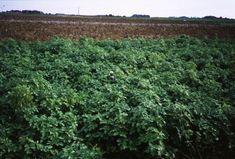
Philip Huxtable is acutely aware of the need for farmers to help conserve the countryside and its wildlife for future generations. As technical director for a LEAF (Linking Environment and Farming) demonstration farm in East Yorkshire, he believes environmental goals and the production of wholesome, affordable food can go hand in hand if pesticides are used intelligently.
But Huxtable is concerned that proposals by the European Commission to change the regulations governing pesticide use in the European Union will strip farmers of their last lines of defence, causing yields to decrease and forcing member states to import even more produce from outside the EU.
An employee of JSR Farms Ltd, the UK’s largest family farming business, Huxtable and his team are responsible for just over 3,000 hectares. Crop choice is diverse: around half the land is dedicated to arable crops, including winter wheat, winter barley, spring barley and oilseed rape, which is complemented with willow as an energy crop, grass for cattle fodder and, of course, the traditional British favourite, potatoes.
As his operation is a LEAF farm, Huxtable takes an integrated farm management (IFM) approach to the land. This means combining traditional farming methods, such as crop rotation, with modern technology, including using pesticides and fertilisers - but only when absolutely necessary to keep animals and crops healthy.
“We keep lots of problems faced by other farmers to a minimum through good crop rotation, thereby reducing the need to spray the crops with pesticides,” says Huxtable.
“First, we will always ask whether we need to spray and what will be the consequences if we don’t. The whole ethos of LEAF is to look at various options for controlling or preventing something harming a crop and to choose the option that is kindest for the environment and the crop. We won’t simply opt for the cheapest pesticide, but will look at those which are safer, even if they may cost a bit more.”
Even with the best will in the world, Huxtable believes that “pesticides are necessary to produce safe food competitively. We are low-cost commodity producers competing on a global market.”
He adds: “2007 has been a year of climatic challenges, and without pesticides we would not have had a harvest. The blight pressure on potatoes was such that most of our crop would not have been marketable without the use of fungicides.”
Moreover, potential alternative solutions to the problems of disease are not always easy to implement, explains Huxtable. Growing blight-resistant potatoes, for example, is not normally a solution, as “we have to grow the varieties required by our customers. It is no good growing a variety that supermarkets won’t put on their shelves,” he says.
Huxtable recognises the positive role the European Commission has played in recent years in reducing the number of dangerous pesticides on the market. “Manufacturers should be encouraged to create products that are safer for the environment and crops, and there have been tremendous advances.”
But he is worried that plans by Brussels to reduce the number of active substances, and reduce the overall use of plant protection products by a fixed percentage, will “create holes in the crop protection portfolio” and allow non-EU producers, often following less rigorous safety guidelines than European farmers, to step in to fill the gap.



